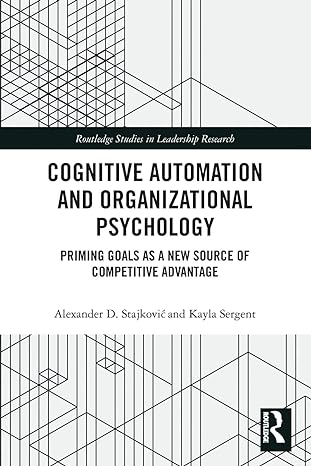Go back


Cognitive Automation And Organizational Psychology Priming Goals As A New Source Of Competitive Advantage(1st Edition)
Authors:
Alexander D. Stajkovic ,kayla Sergent

Cover Type:Hardcover
Condition:Used
In Stock
Shipment time
Expected shipping within 2 DaysPopular items with books
Access to 30 Million+ solutions
Free ✝
Ask 50 Questions from expert
AI-Powered Answers
✝ 7 days-trial
Total Price:
$0
List Price: $115.00
Savings: $115(100%)
Solution Manual Includes
Access to 30 Million+ solutions
Ask 50 Questions from expert
AI-Powered Answers
24/7 Tutor Help
Detailed solutions for Cognitive Automation And Organizational Psychology Priming Goals As A New Source Of Competitive Advantage
Price:
$9.99
/month
Book details
ISBN: 0367785994, 978-0367785994
Book publisher: Routledge
Get your hands on the best-selling book Cognitive Automation And Organizational Psychology Priming Goals As A New Source Of Competitive Advantage 1st Edition for free. Feed your curiosity and let your imagination soar with the best stories coming out to you without hefty price tags. Browse SolutionInn to discover a treasure trove of fiction and non-fiction books where every page leads the reader to an undiscovered world. Start your literary adventure right away and also enjoy free shipping of these complimentary books to your door.
Book Summary: Jobs that were once well-defined are now multifaceted. New realities have placed a premium on employee cognitive processing to fulfill complex occupational roles. But human conscious cognitive capacity is limited, making it nearly impossible for employees to keep up without being overloaded. Stajkovi? and Sergent refute the common assumption that technological automation is the only way forward. Instead, they directly tackle the issue of employee cognitive overload by proposing cognitive automation as an alternative solution. The authors present a sampling of cutting-edge research showing that conscious guidance is not required for all goal pursuits; goal-directed behavior at work can be automated via priming of subconscious goals. Building on research in social psychology and organizational behavior, Stajkovi? and Sergent introduce four models to explain how subconscious goals are primed in organizations:•Auto-motive model: Repeated practice with a goal makes cognitive automation possible.•Goal contagion: Observing and inferring goals of others creates cognitive automation.•Means-goal priming: Confidence in your goal pursuit enhances cognitive automation.•A history of reinforcement: Money, feedback, and social recognition used to reinforce goal achievement become associated with the goal, resulting in cognitive automation.The authors canvas a broad range of knowledge concerning the problem of employee cognitive overload in contemporary organizations and rely on multidisciplinary research to propose cognitive automation as a solution that can address it directly. This book is a deep well of valuable information for those interested in solving real work problems with application of science of organizational behavior (SOB).
Customers also bought these books
Frequently Bought Together
Top Reviews for Books
Request str3hpt
( 5 )
"Delivery was considerably fast, and the book I received was in a good condition."










